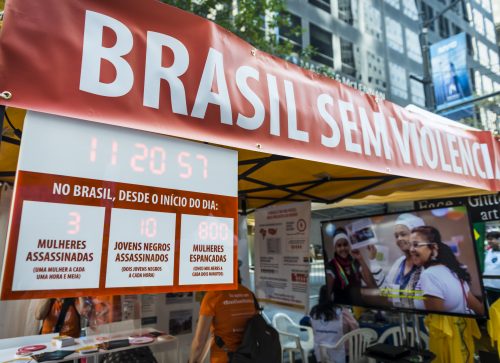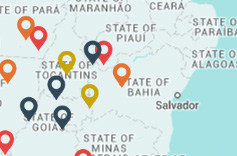 In a first for Brazilian Day, the Brazil Human Rights Fund and the Elas Fund will bring the campaign “Brazil against violence” to one of New York’s largest street festivals of the year, with the goal of publicizing the two foundations’ work to confront current violations through support for civil society organizations who defend human rights throughout the country. The campaign is supported by the Ford Foundation.
In a first for Brazilian Day, the Brazil Human Rights Fund and the Elas Fund will bring the campaign “Brazil against violence” to one of New York’s largest street festivals of the year, with the goal of publicizing the two foundations’ work to confront current violations through support for civil society organizations who defend human rights throughout the country. The campaign is supported by the Ford Foundation.
The participation in this 31st edition of the festival, to be held on September 6, the Sunday right before Labor Day in the United States, also hopes to win over those present to support the campaign.
Created in 1984 on 46th Street, known as Little Brazil, Brazilian Day brings together an audience made up of Brazilians living throughout the United States as well as admirers of our country’s culture. During the huge party, they celebrate the independence of Brazil, listen to music, dance and can taste some of the foods they miss the most.
Brazilian Day is co-sponsored by businessman João de Matos, the newspaper The Brasilians and André Dias, special projects director at TV Globo. It averages around 1.5 million people a year, gathering on 6th Avenue from 43rd Street to Central Park, along with Little Brazil.
This year, shows will include the country singer and songwriter Paula Fernandes and the romantic singer Fábio Júnior. There will also be a commemoration of 30 years of axé music, with performances by the percussion group Olodum and singer Durval Lelys, former vocalist of the band Asa de Águia.
Along with music and contact with Brazilian culture, festival atendrees will have the opportunity this year to contribute to mobilizations for the rights of all. Volunteers from the Brazil Fund and Elas will circulate through the crowd to explain the work done by the organizations they support and the forms of collaboration. Those interested in knowing more can visit a stand located between 46th and 47th Street.
Unacceptable numbers show the need for mobilization against the different forms of violence that currently occur.
Among these numbers is the percentage of youth and blacks murdered in Brazil. In 2012, 30,000 of the 56,000 people murdered were between the ages of 15 and 29. Of those, 77% were black.
Violence is a daily reality for Brazilian women, too. According to “Brazilian women in public and private spaces”, a publication from 2011, five women are assaulted every two minutes in the country, and one in every five women is considered to have suffered some type of violence from men, acquainted or not. The partner (husband or boyfriend) is responsible for more than 80% of the related cases.
Brazil Human Rights Fund
Created by respected activists and academics, the Brazil Fund began its activities in 2006 as a private non-profit foundation. It has been responsible for directing R$ 11.7 million to around 300 projects throughout the country by way of its nine annual and five specially-themed funding rounds. It holds training workshops for project representatives and human rights network members and carries out visits to monitor progress in every region of Brazil.
Its mission is to contribute to the realization of human rights in the country, building innovative and sustainable mechanisms that can channel resources toward strengthening civil society organizations and develop social justice philanthropy.
Elas Fund
Launched in 2000, the Elas Fund is the only foundation of its kind that focuses exclusively on the promotion of the rights of young and adult women in Brazil, and was the first social justice foundation in the country. It mobilizes and invests resources in initiatives that empower women, with the view that they are the main agents of societal transformation.
It has already supported 320 women’s groups throughout every region of Brazil, by way of 19 special funding rounds. It has invested R$ 7.4 million — R$ 6 million in donations and the rest in capacity building for the organizations and groups supported. It supports groups that promote economic independence; entrepreneurship; access to education; prevention of violence against women and girls; the defense of rights; access to health care; the inclusion of new information technologies; art and culture; the preservation of the environment and biodiversity; respect for ethnic, racial, sexual and generational diversity; and access to sports.
Along with financial support, it also accompanies the actions and activities of these groups.







